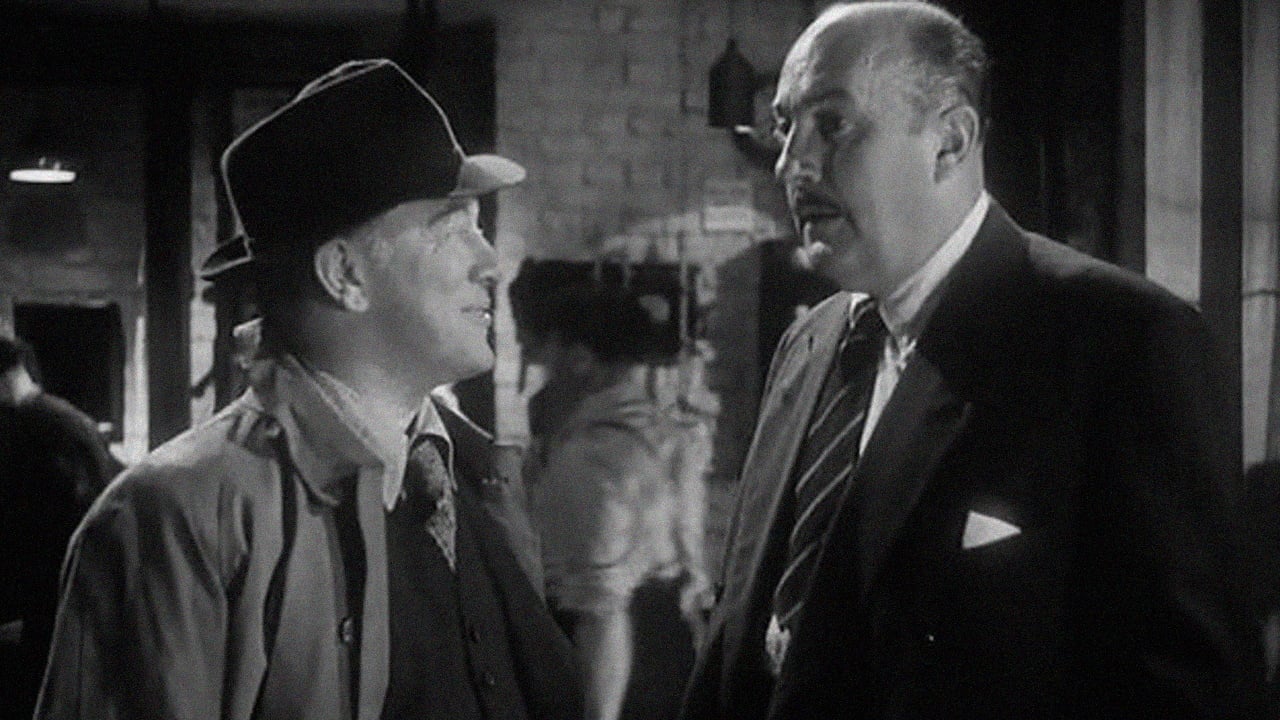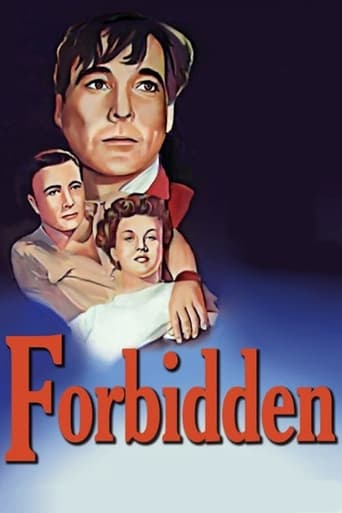

Very well executed
... View MorePretty good movie overall. First half was nothing special but it got better as it went along.
... View MoreThis movie feels like it was made purely to piss off people who want good shows
... View MoreOne of the worst ways to make a cult movie is to set out to make a cult movie.
... View MoreI always thought Douglas Montgomery was one of the better young actors to come to prominence in the early thirties. With his blonde good looks and his chortling laugh he seemed sincere and natural and reading different comments that he made during his career he seemed passionate about acting and really strove to give good performances. He stayed in England after the war and gave two marvellous performances - first as the despondent airman in the superior British War film "The Way to the Stars", then, a couple of years later in his last film "Forbidden", as a research chemist forced into demeaning work by his unscrupulous wife. Critics felt it was the best work of his career but until lately it has been unavailable for over 50 years except for a television showing in 1978.Director George King gave the film a noir look, very in keeping with the American tradition, especially Hitchcock where he seems to have copied the maestro's style. Blackpool's Golden Mile is the setting with Jim Harding (Montgomery) forced to become a patent medicine salesman at the local funfair because of his wife, Diana's, grasping ways. He is desperate to put his research talents to good use but instead finds himself selling potions for baldness and stomach disorders to give his wife the money she needs to further her theatrical career. Called "The Professor" by his friend and spruiker (Ronald Shiner in a typical mile a minute role), things start to come unstuck when his former mentor visits him and is appalled by his comedown. They agree to meet for a meal but even though Jim pleads off on the excuse that his wife is sick, when Dr. Franklin meets Diana (Patricia Burke) the next morning he recognises her as one of the night club patrons of the evening before.Before Hazel Court became entrenched in horror pics and Roger Corman, she was, in the 1940s, part of Rank's rising generation of young hopefuls and cut her teeth in "Champagne Charlie", "Carnival" etc and was the first choice of lead for "The Red Shoes" when it was originally conceived as a straight drama. She looked absolutely gorgeous and vibrant as Jane, the feisty ice cream stall worker and the one who puts the spring back in Jim's step. They embark on an affair - a scene you would never see in an American film at the time, the two sharing a morning cup of tea, sitting on an unmade bed that has obviously been occupied by two. Very risqué - but very natural as British cinema was discovering realism!!Meanwhile Diana is desperate to return to the stage but her "mentor" is stringing her along - she is just too talentless to play the leads she craves. She is all set to run away with him but he is one jump ahead and leaves her stranded at the station. Her return home precipitates a series of events that ends with Jim fighting it out with one of the razor gang boys on top of Blackpool Tower.It was very Hitchcockian in it's filming and setting - nothing like a funfair to bring out sordidness and murder ie "Strangers on a Train" and "Quicksand", but I did find it slightly irritating when the leading man acts in a completely irrational way, obviously just to prolong the story which would have been better with a tighter editing job anyway. Still great to see a film long thought of as lost.
... View MoreWould-be scientist Douglass Montgomery (Jim) teams up with salesman Ronald Shiner (Dan) to rid tourists in Blackpool of their money by selling medicine that re-grows your hair amongst other things. On a nearby stall, Hazel Court (Jane) has the hots for Montgomery, and they soon embark on an affair. Naughty Douglass – he's married to Patricia Burke (Diana). However, she is more interested in pursuing her acting career and is prepared to sleep her way onto the casting couch, her current favourite being Garry Marsh (Jerry). Montgomery wants a divorce but Burke won't give him one and so he hatches a plan to bump her off. He interferes with her own daily medicine and finds her dead. He then buries her in his studio and now he's really in trouble. The story is told in flashback before we end the film with a chase and fight on Blackpool Tower.I like this film. Uk films are pretty good from this time, providing they are not comedies. The best in the cast is Patricia Burke. She excels as a bitch and it's a shame that she is killed off so early. There are several funny moments as demonstrated by Burke's self-assured nastiness. The scene where she visits Court is a classic as is the way she lets Montgomery know that she's going off to stay with a relative yet blatantly has her current beau escort her into a cab. And then presents Montgomery with the bill for her new change of clothes as she departs. A very wicked woman! And there are tense moments including the fight at the finale between Montgomery and love-rival Kenneth Griffith (Johnny). The scene is finished in an unexpected but refreshing way that demonstrates how to conduct oneself in a potential death situation. Jolly good manners all round.It's nice to see the Blackpool Tower, which the French obviously copied to make their own version – the Trifle Tower or something like that. Not a patch on Blackpool. I could imagine Michael Redgrave and Googie Withers playing the husband and wife team – they looked a bit similar to Montgomery and Burke – but Montgomery and especially Burke do justice to their roles. I'm not sure why Montgomery didn't just tell Hazel Court that he was married and I'm not sure where the title comes from, but it's an enjoyable film.
... View MoreMontgomery plays a chemist who seems to make more money from working in a fair than he would at his actual profession.not surprisingly he falls for the charms of Hazel Court.Problem is that his adulterous wife wont give him a divorce.So in the end he decides that there is only one cause of action,namely to murder her.Whilst it is a familiar story it is reasonably well done.There is one scene on the stairs where Montgomery is about to let his wife fall down the stairs in the middle of a convulsion which is reminiscent of "The Little Foxes".He decides to bury her body when she does succumb to a fatal heart attack as he thinks he has poisoned hers taken off by the police it is on the assumption that he will only get a couple of months.Not strictly correct particularly as he could also be accused of attempted murder.The film is actually quite frank on sexual matters for its day.Montgomery is shown dressing in Courts bedroom and also with her in a hotel in Wales.I wonder if this film was released in the states as i would have thought that it would have breached a large part of the code.
... View MoreI found Douglass Montgomery a bore. The setup is good, though. He's a chemist who's forced to manufacture and sell patent medicines from a fairground booth in Blackpool to keep his sluttish wife. She's the best thing in the movie, played well by Patricia Burke in a succession of alarming costumes. When she dresses up for best she puts a couple of cabbage roses on her head, plus a veil, drapes a dead fox round her neck and sticks a large bow on her bottom. Her love rival, played by Hazel Court, is far more stylish. Hazel makes only the faintest attempt to sound anything other than stage school ("I'll stick with me own kind.") She's meant to be a soft drink and candy floss seller with a lot of shady mates. She lives in a terrace house, but Montgomery and Burke live in a rather wonderful art deco block. What's interesting, though, is that it's quite clear that Burke is sleeping with an older admirer in order to get a part in a play. And when Montgomery gets off with Court they make love in the sand dunes and he then practically moves into her place. And we think we invented sex! Or as Philip Larkin wrote, "sexual intercourse began in 1963" - a long way after this movie.
... View More